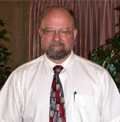I will celebrate my 22nd year as pastor of Grace Reformed Church this year.
And these 20-plus years have been spent in an intense study of the Bible. This has only amplified my convictions regarding the sufficiency and authority of God’s word.
Here are just a few of them:
First, God’s word is eternal and unchanging.
Jesus said, “I am the way, the truth, and the life. No one comes to the Father except through Me” (John 14:6).
Notice the “No one,” this is certainly not the emergent church’s postmodern world-view of tolerance.
Better go with God’s view because it’s an “either, or” situation.
Secondly, salvation is by faith, not works.
“By grace you have been saved through faith, and that not of yourselves …” (Ephesians 2:8).
Where is the “diversity” of salvation? No diversity here, it is salvation by grace alone, “sola gratia.” The ultimate “diversity” will be those in heaven saved by grace alone, and those in Hell who thought their own good deeds and sacraments would justify them.
Third, the doctrine of sin. Postmodern preaching has all but done away with the reality of sin and guilt. You see, “sensitive seekers” are too sensitive to discover they are sinners. And besides, it might cause harm to the church budget if someone leaves worship feeling bad about offending a holy God. But denying sin is like denying you have cancer after the doctor has told you so.
John asserts, “If we say we have no sin, we deceive ourselves” (1 John 1:8, 9).
And my concluding conviction is the friendship between science and faith. Much of my academic work was in science, and this interest continued after my conversion. I never found science to be at odds with biblical Christianity: what is at odds with the Gospel are the false interpretations made from wrong presuppositions. Natural revelation, itself, is not in conflict with nor hostile to special revelation.
Dr. John Polkinghorne, one of Britain’s top scientists, winner of the Templeton Prize; one-time president of Queen’s College, Cambridge, whose, expertise lies in the field of Mathematical Physics, writes: Theology and science are based upon the same presuppositions about the World: for in both, faith and science, we seek to offer explanations of reality—things the way they really are…we should recognize the harmony between natural and special revelation and reject any theory that tells us that we must ignore the facts…” (Faith of a Physicist).
Unfortunately, today’s “high priests” of human knowledge feel they can also dictate to the general public, as well as the church, not only matters below—but matters divine. And so science deified operates on the philosophical presupposition that the universe is the product of random chance, yet the whole practical enterprise, in their minds, rests upon the idea that there is order and design. You cannot have it both ways. The problem here, really, is irrationality: sin is deceitful and a denial of the creator God. On the one hand, they wish to assert that their facts point to order, and not chaos, yet I would insist the rational mind cannot presuppose order and design without that leading to some sort of belief about how order and design came into existence. What modern science has so smugly created is simply naturalistic religion whereby natural law has become the master, rather than the effect of an almighty God.
Even so, there is something far more compelling than the philosophical descantings of mere mortals: The words of David in the 19th Psalm, “…The heavens declare the glory of God, and the sky above proclaims his handiwork. Day to day pours out speech, and night to night reveals knowledge” (Psalm 19:1,2).
Freeman Dyson, a theoretical physicist well known for his award-winning work in quantum field theory, has written: “The more I examine the universe and the details of its architecture, the more evidence I find that the universe in some sense must have known we were coming” (Science & Christian Belief, p.76).
While I believe God created in a literal six-day creation on the basis of special revelation (Genesis 1:1), reasonable men will see a designer in the heavenly bodies above, and in the quantum world below. For example, reasonable men realize if we were a few thousand kilometers farther from the sun, we would be frozen. And if we were a few thousand kilometers closer, we would be roasted. We are at the precise distance where life is possible. Astronomers call this “the Goldilock’s zone.” Someone made this.
Science and Christianity can be friends; in fact, I would go further and say more than friends, they are brothers. Atheists like Richard Dawkins and Sam Harris may create artificial mechanical constructs to pit Christianity against science, but we know better. Remember what the author of Hebrews writes on this very topic: “Now faith is the assurance of things hoped for, the conviction of things not seen. For by it the people of old received their commendation. By faith we understand that the universe was created by the word of God, so that what is seen was not made out of things that are visible” (Hebrews 11:1-3).
Recommended Reading:

